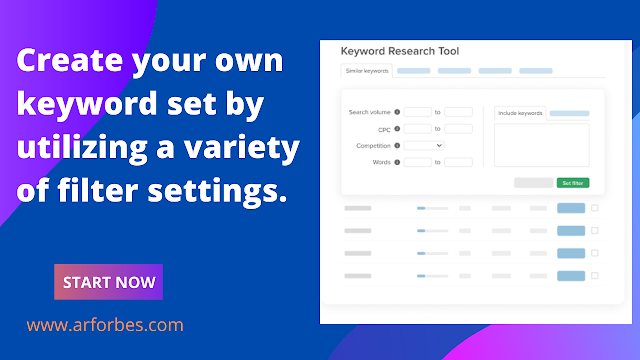Find keyword ideas with seobility Research Tool-seobility.net
Discover relevant keywords for your website quickly and easily with the Keyword Research Tool from Seobility.
A free Seobility service allows you to check up to 1,000 subpages.
- An in-depth SEO assessment of your entire website
- Email notifications and reporting
- Monitoring of Keyword Rankings
Free Keyword Research Tool
Are you seeking new article ideas for your target keyword? You can simply identify comparable terms that might be appealing to the target by using Seobility free Keyword Research Tool.
Furthermore, competition research reveals your rivals’ traffic sources, allowing you to determine whether these terms are a suitable fit for your website as well.
You may focus your search to terms with high search traffic and low competition by using various sorting and filtering tools. This manner, you can easily identify low-hanging fruit for your website!
Create your own keyword set by utilizing a variety of filter settings.
With a single click, you can add keywords to your Seobility project.
Our Keyword Research Tool’s filter settings allow you to further refine the countless keyword possibilities. You may, for example, search for short- and long-tail keywords by specifying the number of words to include or omit from the results.
The results page offers vital information about each term, such as monthly search volume, competitiveness, and average CPC. It also allows you to calculate your chances of success by analyzing the top 10 websites ranking for this phrase on Google.
After you’ve made your selection, you may export the results list as CSV or PDF.
What distinguishes the Keyword Research Tool from Google’s Keyword Planner?
The Keyword Research Tool aids in the analysis of organic search results.
Why should you utilize a keyword research tool instead of Google’s Keyword Planner, which also includes free keyword suggestions such as search volume and CPC?
Google created the Keyword Planner as part of their Google Ads platform to assist businesses in selecting the best keywords to target with their ad campaigns. As a result, it only displays information relevant to paid search, such as search volume, CPC, and Google Ads competition.
The Seobility Keyword Research Tool provides much more, including various other organic search analytics.
For example, you can acquire essential facts about each result, such as monthly traffic, domain rating, and number of backlinks, by checking the top 10 Google search results for each phrase.
Furthermore, you may run a competitor study to see which phrases your rivals rank for but you do not, as well as which keywords, they target in their Google Ads campaigns.
Keyword research centered on a certain keyword
Look for appropriate keywords related to your main theme.
To get related terms, simply enter your focal keyword or a keyword combination and, if necessary, alter the country.
The Keyword Research Tool will provide multiple keyword suggestions from several categories, including:
- Keywords that are similar to the phrase you typed
- Questions about the keyword that search engine users regularly ask
- Google displays related queries in its search results
- Google suggests autocomplete searches as you write
- Related terms from the same general category as the keyword entered
Watch 7 Free Keyword Research Tools for SEO, Bloggers
Using a URL/domain to do keyword research
Identify the keywords for which a domain or URL ranks In the second component of the Keyword Research Tool, you may examine any domain or URL to identify the keywords for which it ranks, both organically and in sponsored search.
Important information such as the domain’s rank and the projected traffic each term brings to the site will be presented. You may also look at the other URLs that rank in the top ten for this keyword.
What are “People also search for” results and when do they appear?
PASF suggestions turn up in your search results when you type in a search query, click on a given organic search result and then return to the search results page looking for more options. You’ll then notice the PASF box right below the link you just visited.
This almost seems like Google suggesting, “Didn’t find what you’re looking for? These topics could help.”
The search suggestions that appear in the PASF box are based on URLs. The topics you see in the box are related to the URL of the result you just clicked on and not the original search string you typed out.
Currently, the PASF box on desktop, pulls up six related topics, two lesser than the PASF results that you get on the SERPs on mobile devices.
Here’s an example of what it looks like:
How to optimize your pages for PASF?
Know the search intent
You need to be able to create content that matches the search intent. For this, you will need to look up related searches, analyze the purpose of the search query, and drill down to what the customer is looking for.
Identify and implement key search terms
Do in-depth keyword research and identify relevant search terms that you can include in your content. To get your web page to rank higher, you need to include topically connected search terms and different questions that people use on search engines.
Add FAQ schema to your web pages and blog posts
Another great way to optimize your pages and find your way into Google’s search-assisted features is to add a FAQ scheme on your website. This is a specialized markup code that you can place on your website to amplify your content for SEO.
Doing this will let the search engine know that your content is displayed in a question and answer format, making it eligible for rich snippets on Google’s SERPs.
Tools that will help you find PASF keywords
Dashboard PASF finder is a free tool to find all the “People also search for” recommendations by Google for any given keyword.
This is an extremely powerful tool that
- automatically scrapes PASF queries
- shows the respective search volume
- attaches the keyword difficulty
- tells you the CPC for each term
In our opinion, this is by far the best tool out there to effortlessly look for PASF keywords without paying a dime. You don’t even need to sign up to use it.
Keywords Everywhere
Keywords Everywhere, a browser add-on for Google Chrome and Firefox is another great tool to find PASF keywords.
The tool provides the ‘People Also Search For’ data along with the monthly search volume, CPC, and competition metrics, across multiple devices. To be able to view the monthly search volume you will need to purchase credits within the tool.
Once you’ve got the add-on installed, every time you key in a search query either on Google or Bing, you will get two widgets to the right-hand side of the search results page. The top widget will display the related terms whereas the bottom widget will give you the ‘People Also Search For’ terms for every search result in the SERP.
Extract people also search phrases in Google
Extract people also search
This Chrome extension helps SEO specialists and people invested in optimizing content for SEO and add all the key search terms and relevant keywords to their content.
This is made possible by pulling up all the phrases from the ‘People Also Search For’ feature and showing it to the top-right corner on every SERP. You can then build content with topically connected keywords and phrases that will in turn help you rank higher in search results.
Optimize your content
Did you find the perfect keyword to target? The next step is to optimize your content for that keyword.
With Dashword, you can forget about spending hours researching for key search terms to include in your posts and web pages. Dashword does it for you in just a click.
GET YOUR FREE TOOLS FOR
Click here to start Keyword search
With real-time feedback, you get to improve your content with top keywords and questions that directly address the topically related search queries.
Keyword Analysis of Competitors
Compare your search performance to that of your competitors.
You may use the tool to compare your site’s organic and paid ranks with up to two rivals in addition to undertaking keyword research using a keyword or a domain. There are two types of analysis available: “GAP” and “Intersections.”
The GAP analysis will disclose the keywords that your rivals are ranking for but you are not (in both organic and paid search results). You may simply discover fresh ranking prospects for your website this way!
When you select intersection analysis, you will be given a list of all the keywords for which each of the domains supplied is ranking. You’ll be able to identify at a glance where you’re already ahead of your competition and where you may improve.
© copyright 2019 – all rights are saved













1 Comment
Wow, wonderful weblog format! How long have you been blogging for?
you make blogging look easy. The total glance of your website is wonderful, let alone the content!
You can see similar here najlepszy sklep